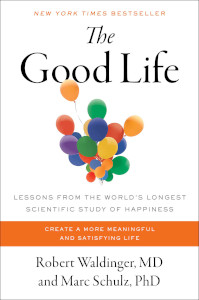Harvard academics discuss happiness
Posted by Elena del Valle on May 17, 2023

The Good Life
Photos: cover photo courtesy of Simon and Schuster, Robert Waldinger photo by Katherine Taylor, Marc Schulz photo by Ann Chwatsky
Robert Waldinger, Ph.D., director, Harvard Study of Adult Development, and Marc Schulz, Ph.D., associate director of the same study, believe healthy relationships are key to happiness. They explain their reasons in The Good Life Lessons From the World’s Longest Scientific Study of Happiness (Simon and Schuster, $28.99), a 341-page hardcover book published this year.

Robert Waldinger, Ph.D., co-author, The Good Life
Along with reading, writing and arithmetic the authors propose that social fitness should be taught to children and included in public policy considerations. It should also be an important part of adult lives; emphasis on relationships, they say in the book, pays off.

Marc Schulz, Ph.D., co-author, The Good Life
The authors reached their conclusions based on the findings of the Harvard Study of Adult Development, a multi-generational volunteer study conducted by Harvard researchers among students beginning in 1938, and later paired with a study of area non students from disadvantaged backgrounds. In total more than 2,000 people, a high percentage of the initial participants and their descendants, shared personal information, answered questions over their lives, provided blood samples, and in some cases donated their brains after their passing in furtherance of the study goals.
Waldinger and Schulz discuss the study findings in the book while weaving stories around the lives of some of the participants (keeping their identities private) and their relatives. It’s never too late, the authors say, about finding happiness and changing attitudes and behaviors. Life is in many ways, at least for the study participants, about the joys offered by relationships rather than financial successes, it seems. The authors acknowledge that some participants may have altered their views and behaviors as a result of their participation in the study.









